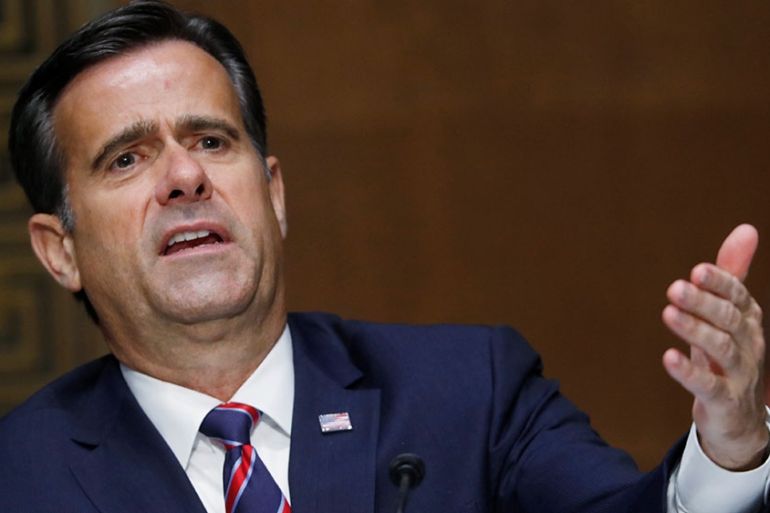Senate confirms John Ratcliffe as new US spy chief
Republican ally of Trump takes control of sprawling US intelligence agencies after partisan purge of top officials.

President Donald Trump’s nominee to be the next United States spy chief, John Ratcliffe, was confirmed by the Senate on Thursday.
The Senate voted 49-44 along partisan lines to confirm Ratcliffe, whose nomination last year was withdrawn in the face of bipartisan opposition.
Keep reading
list of 3 itemsUS says ‘significant evidence’ coronavirus came from China lab
Trump to withdraw US from Open Skies arms control treaty
Ratcliffe is a Republican member of the House of Representatives and was a vocal defender of Trump during the president’s impeachment in 2019.
Democrats opposed Ratcliffe’s nomination but dropped procedural objections to a quick vote as members of both parties want a Senate-confirmed nominee in the job.
The post had been temporarily filled by acting director Richard Grenell, a Trump loyalist who oversaw a shake-up in US intelligence agencies that raised concerns on Capitol Hill.
Ratcliffe is seen to be similarly loyal to Trump but he promised in his Senate confirmation hearing to be an independent head of the nation’s intelligence agencies and said he would keep Congress informed of important developments.
Ratcliffe replaces former Director of National Intelligence (DNI) Dan Coats, a former US senator who had good relationships with legislators but clashed with Trump.
Trump, who has long been sceptical of the nation’s intelligence community, has installed acting heads and removed and fired multiple intelligence officials.
Ratcliffe was first picked by Trump for the post in July 2019, shortly after Coats’s resignation, but then withdrew after some Senate Republicans questioned his lack of experience.
Republican senators warmed to Ratcliffe after Trump unexpectedly nominated him again in February, as concerns grew about Grenell and the turnover in the intelligence community.
Most Republicans have praised Ratcliffe since his second nomination. But Democrats have been sceptical that he will serve with the independence they say is crucial for the job.
As DNI, Ratcliffe will assume leadership of 17 intelligence agencies including the CIA, the Defense Intelligence Agency and the National Security Agency.
At his hearing, Ratcliffe worked to separate himself from the president, including by saying he believed Russia interfered in the 2016 presidential election, a conclusion Trump has often resisted.
He said he would communicate to Trump the intelligence community’s findings even if he knew Trump disagreed with them and might fire him.
|
|
Democrats were not convinced. The top Democrat on the panel, Virginia Senator Mark Warner, told Ratcliffe at the hearing “I don’t see what has changed since last summer”, referring to when Ratcliffe’s nomination was withdrawn in 2019.
Ratcliffe’s recent nomination was approved 8-7 in a closed committee hearing Tuesday, with all Democrats voting against it, according to a committee aide.
Ratcliffe sits on the House intelligence, judiciary and ethics committees. He was a member of Trump’s impeachment advisory team last fall and aggressively questioned witnesses during the House impeachment hearings.
He forcefully questioned former special counsel Robert Mueller last year when Mueller testified about his investigation into Russian interference in the 2016 presidential election.